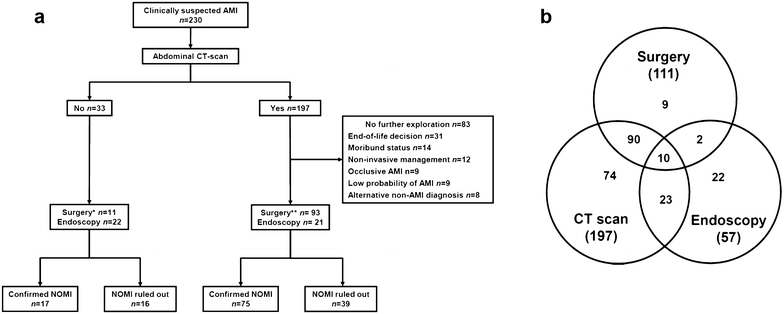Diagnosis of non-occlusive acute mesenteric ischemia in the intensive care unit
- PMID: 27858375
- PMCID: PMC5114213
- DOI: 10.1186/s13613-016-0213-x
Diagnosis of non-occlusive acute mesenteric ischemia in the intensive care unit
Abstract
Background: Non-occlusive mesenteric ischemia (NOMI) is a common complication and accounts for a major cause of death in critically ill patients. The diagnosis of NOMI with respect to the eventual indications for surgical treatment is challenging. We addressed the performance of the diagnostic strategy of NOMI in the intensive care unit, with emphasis on contrast-enhanced abdominal CT-scan.
Methods: This was a retrospective monocenter study. Patients with clinically suspected acute mesenteric ischemia were included if a comprehensive diagnostic workup was carried out including surgical and/or endoscopic digestive explorations. Patients with evidence of occlusive mesenteric ischemia were excluded. A definite diagnosis of NOMI only relied on surgical or endoscopic findings. Abdominal CT-scans were reviewed by two radiologists blinded from the final diagnosis.
Results: A diagnosis of NOMI could be definitely confirmed or ruled out through surgical or endoscopic explorations of the digestive tract in 147 patients. With respect to their clinical characteristics, only a history of atrial fibrillation was an independent predictor of NOMI (odds ratio 8.3, 95% confidence interval 2.0-35.2, p = 0.004). Among them, 114 patients (75 with and 39 without NOMI) had previously been subjected to contrast-enhanced abdominal CT-scan. Portal venous gas, pneumatosis intestinalis and, to a lesser extent, abnormal contrast-induced bowel wall enhancement were poorly sensitive, but exhibited good specificities of 95, 85 and 71%, respectively. Nineteen out of 75 patients (25.3%) without any suggestive radiological signs finally exhibited mesenteric ischemia, including ten with intestinal necrosis.
Conclusions: The performance of abdominal CT-scan for the diagnosis of NOMI is limited. Radiological signs of advanced-stage ischemia are good predictors of definite mesenteric ischemia, while their absence should not be considered sufficient to rule out the diagnosis.
Keywords: CT-scan; Endoscopy; Intensive care unit; Ischemia; Mesenteric; Surgery.
Figures


References
-
- Guillaume A, Pili-Floury S, Chocron S, Delabrousse E, De Parseval B, Koch S, et al. Acute mesenteric ischemia among post-cardiac surgery patients presenting with multiple organ failure. Shock. 2016 - PubMed
-
- Corcos O, Castier Y, Sibert A, Gaujoux S, Ronot M, Joly F, et al. Effects of a multimodal management strategy for acute mesenteric ischemia on survival and intestinal failure. Clin Gastroenterol Hepatol. 2013;11(158–165):e2. - PubMed
LinkOut - more resources
Full Text Sources
Other Literature Sources

